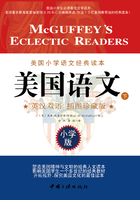
第8章 "?I Pity Them" “我同情他们”
A poor man once undertook to emigrate from Castine, Me., to Illinois. When he was attempting to cross a river in New York, his horse broke through the rotten timbers of the bridge, and was drowned. He had but this one animal to convey all his property and his family to his new home.
His wife and children were almost miraculously saved from sharing the fate of the horse; but the loss of this poor animal was enough. By its aid the family, it may be said, had lived and moved; now they were left helpless in a land of strangers, without the ability to go on or return, without money or a single friend to whom to appeal. The case was a hard one.
There were a great many who "passed by on the other side." Some even laughed at the predicament in which the man was placed; but by degrees a group of people began to collect, all of whom pitied him.
Some pitied him a great deal, and some did not pity him very much, because, they said, he might have known better than to try to cross an unsafe bridge, and should have made his horse swim the river. Pity, however, seemed rather to predominate. Some pitied the man, and some the horse; all pitied the poor, sick mother and her six helpless children.
Among this pitying party was a rough son of the West, who knew what it was to migrate some hundreds of miles over new roads to locate a destitute family on a prairie. Seeing the man's forlorn situation, and looking around on the bystanders, he said, "All of you seem to pity these poor people very much, but I would beg leave to ask each of you how much."
"There, stranger," continued he, holding up a ten dollar bill, "there is the amount of my pity; and if others will do as I do, you may soon get another pony. God bless you." It is needless to state the effect that this active charity produced. In a short time the happy emigrant arrived at his destination, and he is now a thriving farmer, and a neighbor to him who was his "friend in need, and a friend indeed."
曾经有一个穷人,他从缅因州迁移到伊利诺伊州。当他试图渡过纽约的一条河时,马踩断了已经腐朽的木桥,掉进河里淹死了;而他只有这么一头牲口,驮着所有的财产还有家人到新家去。
然而幸运的是,妻子和孩子被救了下来,他们没有像可怜的马儿一样失去性命。但失去马匹就足够让他们烦恼的,它活着的时候帮这一家人运东运西,现在死了,只留下无助的一家人站在一片陌生的土地上。他们既不能返回又无法继续前进,此刻他们身无分文,在这儿又没有可依靠的朋友,情况很糟糕。
有很多人从他们身边经过,一些人甚至嘲笑这一家人的处境。不过还是有同情他们的人,不一会儿便有许多人围住了他们。
一些人非常同情这个穷人,也有一些人不怎么同情他,因为他们认为他不该试图穿越那条危险的木桥,并且应该让马匹从河中游过去。然而,同情他的人还是较多。有些人同情那个穷人,也有一些人同情那匹马,更多的人则是同情那个可怜、生着病的母亲和六个无助的孩子。
人群中有一个人是西部人的儿子,他长得很强壮,深知辛辛苦苦地经过千山万水,来到草原上组建一个新家有多么难。看了看绝望的穷人,又看了看周围的旁观者,他说:“你们看起来非常同情他,那么请允许我问问你们每个人对他的同情到底有多少。”
“给你,陌生人,”他拿出一张十美元的钞票,继续说道,“这是我对你同情的数额,如果其他人也能像我一样,那么你很快就能买一匹马了。愿上帝保佑你。”无需多说,他这一施舍举动很快就有了成效。就这样,那位快乐的移民在很短的时间内就到达了目的地。现在他经营着一个兴盛的农场,而他的邻居正是那位“患难之交”。